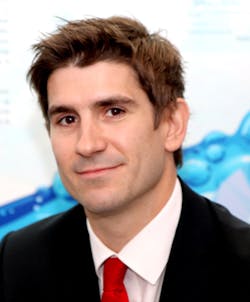By Tom Freyberg, Chief editor
Over 20 years ago the failing Olympic Great British nation started investing heavily into sport, with the results showing at the recent games in Rio. This same success can been seen in water authorities.
Wow. What a summer it’s been for British sport at the Olympic Games in Rio. Picking up 67 medals, including 27 gold, Team GB had its best medal haul for 108 years. From Mo Farah triumphing with two golds in the 5k and 10k events, to the women’s hockey team winning the country’s first medal in the event: there were countless moments that made British people proud.
Interestingly (I will get onto water shortly, bear with me), it’s no coincidence to see a direct correlation between how much investment the country has made compared to the results. Only 20 years ago, Great Britain was 36th in the 1996 Atlanta Olympics, securing a single gold medal. At the time, only £5 million was invested into British sport and athletics.
Fast forward to between 2013 to 2017 and almost £350 million in public funds will be invested in Olympic and Paralympic sports. Key to this change was former Prime Minister John Major’s decision to direct more government investment to elite Olympic sport, together with the start of the National Lottery in 1994. The result? Second place in the Olympic table this year ahead of the mighty China.
The lesson here is that you have to invest for the future. After Atlanta, it might have been easy for governing bodies to…ahem…throw the towel in on Olympic efforts and direct investment elsewhere. Instead, putting funding and infrastructure in place has meant that within two decades the country made history - becoming the only nation to go on to win more medals at the next Olympics than its previous 2012 efforts in London.
The same principle can be applied to how countries adapt to water scarcity. Readers and followers of WWi will have seen our coverage of nations such as Israel, Singapore and Cambodia’s capital city, Phnom Penh. All three addressed issues such as water scarcity, dependence on other nations or high water loss head on.
In the case of Israel, authorities saw water scarcity challenges intensifying so built out its desalination supply and wastewater reuse programme. Singapore is making plans for its fifth desalination project on Jurong Island (here) to create water-independence and Phnom Penh’s water loss reduction efforts from 72% to 6% over 15 years was remarkable. These are just a few of the examples.
On the topic of leadership, in this issue make sure you check out our interview with Xylem CEO Patrick Decker (here); a review of the Industrial Water Solutions Forum in Singapore (here) and a European collaboration to turn waste into ceramic membranes (here). Enjoy the issue.
Tom Freyberg, Chief editor
More Water & WasteWater International Archives Issue Articles




